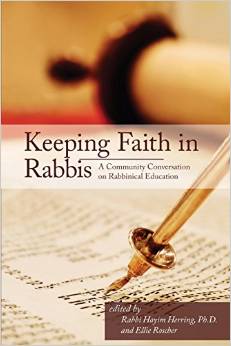Now Available: Keeping Faith in Rabbis: A Community Conversation on Rabbinical Education
Ellie Roscher and I are excited to let you know that you can now order your copy of Keeping Faith in Rabbis: A Community Conversation on Rabbinical Education. It takes a triad to make a rabbi: educators of rabbis, caring laypeople and individuals who want to become rabbis. Keeping Faith in Rabbis is the only volume that brings these three groups of stakeholders together to explore how rabbis might reshape and cultivate a more robust, outward-looking, inclusive 21st Century American Jewish community. Although I’ve been working on this volume for about a year, it still engages me as I listen to authors’ ideas about new potential pathways for rabbinical education and read about redefined roles for rabbis. And yes—contrary to all studies on contemporary Jewish life–it stills surprises me that some essays assume that tomorrow’s Jewish future will essentially be a reiteration of today’s status quo.
In times of disruption and transition, it’s critical to act. But first it’s important to listen, to share ideas, to debate possibilities and to pilot alternatives. That’s why we also have an online component to expand the conversation: https://www.facebook.com/rabbihayimherring. Just scroll through the page and you can already comment on a video interview with Rabbi Lauren Berkun of Shalom Hartman about the length of rabbinical school, and essays from Rabbi Ellen Lewis a rabbi/psychologist and Lisa Colton and Lianna Levine Reisner, mavens on social media and congregations. In addition, we already have plans or are developing them for public programs in Minneapolis, New York, Boston, Los Angeles, Palm Beach, FL and a few other cities. If you’re able to join us for any of these programs, we would love to have you and we’ll keep you posted about program details.
Our goal, which our publisher Avenida Books made happen, was to have the book available to you before Chanukah. The Hebrew root meaning of Chanuka is related both to education and dedication—two themes that resonate well with the holiday and the book. Rabbis have been in the news lately, unfortunately involving their ethical violations (in fact there’s an incredibly timely essay in the book on how to address ethical boundary violations). But Keeping Faith in Rabbis is a reminder of the broader need for forward looking and change-oriented discussions on rabbinical education and leadership—reflecting more on its positive aspects, and critiquing and re-conceptualizing 21st Century rabbinical education and leadership. So enjoy the book and please join us in the conversation!


